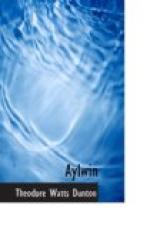It was now that I fully realised for the first time her extraordinary gift of observation and her power of describing what she had observed in the graphic language that can never be taught save by the teacher Nature herself. In a dozen picturesque words she would flash upon my very senses the scene that she was describing. So vividly did she bring before my eyes the scenery of North Wales, that when at last I went there it seemed quite familiar to me. And so in describing individuals, her pictures of them were like photographs.
Graylingham Wood was our favourite haunt. This place and the adjoining piece of waste land, called the Wilderness, had for us all the charms of a primeval forest. Here in the early spring we used to come and watch the first violet uplifting its head from the dark green leaves behind the mossy boles, and listen for the first note of the blackcap, the nightingale’s herald, and the first coo of the wood-pigeons among the bare and newly-budding trees. And here, in the summer, we used to come as soon as breakfast was over with as many story-books as we could carry, and sit on the grass and revel in the wonders of the Arabian Nights. the Tales of the Genii, and the Seven Champions of Christendom, till all the leafy alleys of the wood were glittering with armed knights and Sinbads and Aladdins. The story of Camaralzaman and Badoura was, I think, Winnie’s chief favourite. She could repeat it almost word for word. The idea of the two lovers being carried to each other by genii through the air and over the mountain tops had an especial fascination for her. I was Camaralzaman and she Badoura, and the genii would carry me to her as she sat by Knockers’ Llyn, or, as she called it, Llyn Coblynau, on the lower slopes of Snowdon.
But above all, there was the sea on the other side of the wood, of the presence of which we were always conscious—the sea, of which we could often catch glimpses between the trees, lending a sense of freedom and wonder and romance such as no landscape can lend. Our great difficulty of course was in connection with my lameness. Few children would have tried to convey a pair of crutches and a lame leg down the cliff to the long level brown sands that lay, farther than the eye could reach, stretched beneath miles on miles of brown crumbling cliffs, whose jagged points and indentations had the kind of spectral look peculiar to that coast. For, alas! the holy water Winifred brought did not ‘cure the crutches.’ Yet we used to master the difficulty, always selecting the firmer gangway at Flinty Point, and always waiting, before making the attempt, until there was no one near to see us toiling down. Once down on the hard sands just below the Point, we were happy, paddling and enjoying ourselves till the sunset told us that we must begin our herculean labour of hoisting the leg and crutches up the gangway back to the wood. I have performed many athletic feats since my cure, but nothing comparable to the feat of climbing with crutches up those paths of yielding sand. Once we found on the sand a newly shot gull. She took it in her lap and mourned over it. I guessed who was the poor bird’s murderer—her father!




